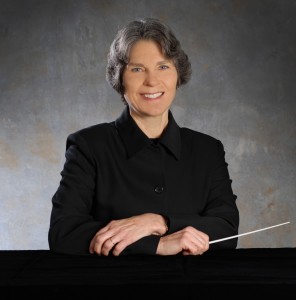Thoughts on Our 40th Anniversary
A dedication by Barbara Jones, introducing the Mozart Requiem
40 years, three concerts a year – that’s 120 concerts. At least eighty major choral works with orchestra, countless instrumental concertos. A room in my house packed with scores, preparatory and rehearsal notes for each work attests to what goes into every performance– surely it is an appropriate time to reflect on this experience!
Our wonderful treasurer keeps track of more than just our financial accounts and discovered that almost 700 individuals have sung with the group, many for multiple decades. Over the years, our instrumentalists have come from 65 towns in four states. Our current singers hail from 16 different communities, our instrumentalists from 25.
While very impressive, these numbers are mere statistics; just as black dots on a page do not constitute music, so these bald numbers do not convey what a community chorus and its instrumental component actually is, what the experience of participating in such a group means to those who choose to come out on a Monday night and challenge themselves, physically, mentally and ultimately, spiritually.
Early on, when we lost one of our members shortly after he left a rehearsal, I began to see how the music we explore together creates a common bond. While the primary purpose of the chorus is not a social society – we just don’t have the time with our mere two hours of weekly rehearsal – nevertheless, we are a community. We learn of and therefore share in the joys and sorrows that visit us all. We celebrate weddings, births, successes, vacation trips; but we also feel the pain and stress of illness, the loss of parents, friends, siblings, spouses and even children. Each season the chorus community changes in subtle ways as life’s more urgent callings draw some away and new faces join in. Yet the group continues to meet and sing, ready to welcome anyone back when circumstances change and they feel the need for the positive energy we provide each other.
During the time we are together on Monday nights, we put aside our personal concerns and fully participate in the task at hand – learning our essential part of a major work, often composed centuries ago by a fellow human being addressing the same significant life issues that we confront.
Choral singing is unlike any other activity I know of. To play a sport at the highest level, you must have inherent physical ability, a tremendous work ethic and appropriate circumstance for development. Very few of us will play tennis on a center court or kick the winning Super Bowl field goal. Mastering a musical instrument sufficiently requires years of dedicated practice. Whatever the field of endeavor, participation at the highest level of the art requires an investment over years in education, training, and a large dollop of lucky circumstance.
In a community chorus, however, the sum is always far greater than any one of its parts. You do not need to qualify for a place on the stage of the MET to participate fully in the exploration of a masterpiece. But you do need each other. Unlike plumbing the depths of a great poem or novel, you cannot do this alone.
“No man is an island” is certainly true in choral or orchestral music. Each person, like a single note on the page, is necessary and important to creating the fabric of the composition, the performance. All must work together, each lending his or her unique vocal timbre, collectively producing an aesthetic and meaningful experience for singer and audience alike.
The single aspect of this chorus of which I am most proud is that it is an un-auditioned group. While we are most fortunate to have many excellent, experienced, serious musicians in our midst, we also have those for whom this is their first exposure to the rewards of choral singing, a first step into the limitless world of great choral literature. It might seem an overwhelming experience at first for some, but people commit to the task, attend rehearsals, study the score – and look what they can accomplish! We have performed very challenging works from Renaissance compositions to the newly commissioned. Perhaps our performance will not win a Grammy award, but for every participant, it is a unique and powerful experience.
Every piece requires a huge investment on the part of many people – the singers, the players, all the volunteers whose behind-the-scenes efforts keep us going. I try to choose worthy compositions, ones that will prove to be building blocks for subsequent repertoire, provide places of reference in the great musical canon. This way, we amateur singers have the opportunity to broaden and deepen our skills, which we can then bring to the next work.
A requiem might seem an odd choice to celebrate a major anniversary, but it is actually very appropriate, as clearly the purpose of such a work is to call for repose, eternal rest, for those who have passed from life, as we all surely will as well. A requiem provides a formal structure or means to work out a response to the universal issues people have always recognized and inevitably face. Many major composers have explored ultimate questions, such as the presence of life in the face of unavoidable death. The traditional Latin liturgy, which Mozart uses here, begins and ends with a prayer to grant eternal rest to those who pass on. Contrasting sections offer vivid portrayals of the terrors that await the unfortunate, the unworthy – as in the Dies Irae (day of judgment) and the Confutatis, with the “flammis acribus” licking at the heels of the petitioners, while they cry for mercy (“voca me,” hear me.) Other composers, such as Brahms and Durufle, rather than depicting the tortures that await the unworthy, focus their attention on the living, as it is through the living that those who pass on will continue to be present.
The great choral literature available to us transcends our individual belief system, allowing us to participate in the insights of some of the greatest musical minds. We deal with “compositions”, something “composed” by a human hand, forged by human experience and realized, brought to life, by other human beings. Unlike so many events in our lives, which appear random, where a plan or design is not apparent, in a composition, order is imposed and creates its own meaning through structural relationships, context, development, climax and ultimately denouement.
Perhaps it is this sense of order and meaning that we all seek, which the arts provide. What can be more organized, logical, inevitable, and satisfying, than a tightly constructed fugue, such as this work features in so many movements?
We dedicate this concert to all those who helped us to this place – especially Ernest Goldman, whose musical talents, vision, generous spirit and inclusive nature began this enterprise so many years ago. Just days before our first performance of this work in 1998, Ernest’s wife Doris was critically injured in a car accident that occurred just down the street. Nevertheless, Ernest played the second and third movements of Brahms’ first piano concerto, and we sang this Requiem with an acute awareness of life’s fragility, sharpened by the nearness of this tragedy.
In today’s performance, I would like to look back and acknowledge all those whose lives have brought us here, whose presence we have enjoyed, who have shared our love of music making. Yet I also look forward to finding meaning and community through our work together in the future. May we continue to explore the full range of human emotions through these great works, and our communal efforts. May we make – and share — a joyful, harmonious sound.
Barbara Jones
March, 2019

